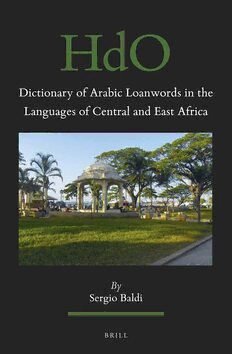
Dictionary of Arabic Loanwords in the Languages of Central and East Africa PDF
Preview Dictionary of Arabic Loanwords in the Languages of Central and East Africa
Dictionary of Arabic Loanwords in the Languages of Central and East Africa Handbook of Oriental Studies Handbuch der Orientalistik section one The Near and Middle East Edited by Maribel Fierro (Madrid) M. Şükrü Hanioğlu (Princeton) Renata Holod (University of Pennsylvania) Florian Schwarz (Vienna) volume 145 The titles published in this series are listed at brill.com/ho1 Cover illustration: Zanzibar, 2016. Photo by author. Library of Congress Cataloging-in-Publication Data Names: Baldi, Sergio, author. Title: Dictionary of Arabic loanwords in the languages of Central and East Africa / Sergio Baldi. Description: Leiden ; Boston : Brill, 2021. | Series: Handbook of Oriental studies. Section 1, the Near and Middle East, 01699423 ; volume 145 | Includes bibliographical references and index. Identifiers: LCCN 2020042391 (print) | LCCN 2020042392 (ebook) | ISBN 9789004438477 (hardback) | ISBN 9789004438484 (ebook) Subjects: LCSH: African languages—Foreign elements—Arabic—Dictionaries. | African languages—Foreign words and phrases—Arabic—Dictionaries. | African languages—Dictionaries—Arabic. | Arabic language—Influence on African languages—Dictionaries. | Africa, Central—Languages—Foreign words and phrases—Dictionaries. | Africa, East—Languages—Foreign words and phrases—Dictionaries. Classification: LCC PL8009 .B35 2020 (print) | LCC PL8009 (ebook) | DDC 496—dc23 LC record available at https://lccn.loc.gov/2020042391 LC ebook record available at https://lccn.loc.gov/2020042392 Typeface for the Latin, Greek, and Cyrillic scripts: “Brill”. See and download: brill.com/brill-typeface. ISSN 0169-9423 ISBN 978-90-04-43847-7 (hardback) ISBN 978-90-04-43848-4 (e-book) Copyright 2021 by Koninklijke Brill NV, Leiden, The Netherlands. Koninklijke Brill NV incorporates the imprints Brill, Brill Hes & De Graaf, Brill Nijhoff, Brill Rodopi, Brill Sense, Hotei Publishing, mentis Verlag, Verlag Ferdinand Schöningh and Wilhelm Fink Verlag. All rights reserved. No part of this publication may be reproduced, translated, stored in a retrieval system, or transmitted in any form or by any means, electronic, mechanical, photocopying, recording or otherwise, without prior written permission from the publisher. Requests for re-use and/or translations must be addressed to Koninklijke Brill NV via brill.com or copyright.com. This book is printed on acid-free paper and produced in a sustainable manner. To Angela and my children Diego and Roberta ∵ Contents Preface ix Abbreviations x Introduction 1 Dictionary Alif 9 Bāʾ 21 Tāʾ 46 Ṯāʾ 50 Jīm 53 Ḥāʾ 68 Ḫāʾ 85 Dāl 98 Ḏāl 110 Rāʾ 113 Zāʾ 129 Sīn 135 Šīn 158 Ṣād 174 Ḍād 185 Ṭāʾ 188 Ẓāʾ 196 ʿAin 198 Ġain 220 Fa ʾ 225 Qāf 240 Kāf 255 Lām 268 Mīm 274 Nūn 285 Hāʾ 296 Wāw 300 Yāʾ 312 viii Contents Addenda 315 Bibliography 316 Arabic Index 324 English Index 353 French Index 406 Index of Scientific Names 441 Preface In June 1975, while traveling to the United States to study, I met Professor Pierre Alexandre. He then directed the Cahiers d’Etudes Africaines at the Department of Human Sciences, Boulevard Raspail, and taught Swahili at the Institute of Modern Oriental Languages (now known as INALCO). He suggested that I re- turn to Paris, after my Fulbright scholarship, to do a doctoral dissertation on Arabic loanwords in Swahili. This chance meeting changed almost all of my academic career. A few years later, I began to study in France, where I enrolled in Professor Claude Gouffé’s Hausa class. The latter, who was kind enough to take an interest in the work I was doing, suggested that I include Hausa in my research. The preparation and discussion of my thesis showed that there was a lot of work to be done on Arabic loanwords, especially with regard to Hausa. Many loanwords could not be explained without considering their meaning in rela- tion to neighboring languages. In 1978, I was appointed to head the Sudanic language courses at the Istituto Universitario Orientale (Naples) and I began to teach Hausa. The academic in- terest that I hitherto devoted to Swahili was reoriented toward West Africa and I began to produce articles on Arabic loanwords in languages close to Hausa, such as Kanuri, Fulfulde, etc., languages that could explain the route the Ara- bic loanwords had taken to reach Hausa, in cases in which the loanwords did not come directly from Arabic. During these years, I greatly benefited from the help and suggestions, first and foremost, of the late Professor Pierre Alexandre and the late Professor Claude Gouffé, whom I can never thank enough. A number of friends and colleagues supported me in one area or another: Norbert Cyffer (Universität Wien), Herrmann Jungraithmayr (Goethe Universität, Frankfurt), and Rudolf Leger (Goethe Universität, Frankfurt) engaged me in very useful discussions during our meetings for Erasmus courses, and Henry Tourneux (CNRS / IRD, Paris) in particular, presented questions on phonetic fonts, and offered aca- demic assistance, suggestions, and encouragement, including with regard to the final format of the publication. Abbreviations Dictionaries and Other Works Daf Dictionnaire arabe-français (dialecte du Tchad) Dfa Dictionnaire français-arabe (dialecte du Tchad) EI2 Encyclopaedia of Islam Vai Vocabolario arabo-italiano Grammatical Abbreviations adj. adjective adv. adverb arch. archaic bib. Bible; biblical bot. botanical cf. refer to coll. collective colloq. colloquial conj. conjunction eg. Egyptian excl. exclamation expr. expression geom. geometric gram. grammar interj. interjection invar. invariable jur. jurisprudence lit. literally n. noun n.v. verbal name neg. negation num. numeral part. particle pl. plural prep. preposition refl. reflexive s. singular
